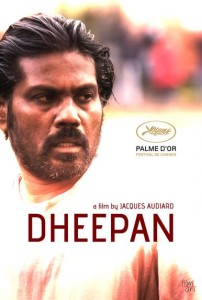Up against (amongst others) Carol and Son of Saul, Dheepan, directed by Jacques Audiard, surprised some by winning the Palme d’Or at the 2015 Cannes Film Festival. With a screenplay by Audiard, Thomas Bidegain and Noé Debré, the film follows three Sri Lankan migrants as they attempt to make a new life for themselves in France following the end of the Sri Lankan Civil War in 2009. However, this is not merely a tale of happy new beginnings. Audiard infuses the film with an uncompromising psychological realism that does not shy away from heavy themes of loneliness and alienation. The film may not be formally inventive, and the ending is a little abrupt in its tonal shifts, but the strength of the performances and of Audiard’s storytelling make Dheepan a solid exploration of the ways in which boundaries are navigated and negotiated through migration – between familiar cultures and foreign languages, between former selves and new identities, and between the past, present and the future.
In the final stages of the civil war, it has become apparent that the Tamil Tigers are losing their fight against the Sri Lankan government. Sivadhasan (Antonythasan Jesuthasan), a Tamil Tiger soldier, decides he needs to leave by seeking asylum overseas. He enrols a young woman named Yalini (Kalieaswari Srinivasan) and a recently orphaned 9-year-old girl Illayaal (Claudine Vinasithamby) to pose as his family so that they can resettle in France. Each of them are also forced to adopt new identities; his is Dheepan. They end up in a housing project in Paris, and Dheepan becomes the caretaker of the building. Forced together by circumstance and desperation, not close connection or love, the fledgling family find it initially difficult to adjust to their surroundings. Complicating their transition is the presence of some questionable characters involved in gangs and drug dealing. Over time Dheepan and his family gradually become accustomed to their lives, but with seeming inevitability the drug-fuelled gang war escalates. Ultimately, the prospect of facing a new conflict forces them to consider making tough decisions about the future of their lives in their new home.
There is an admirable way to which Audiard presents the challenges of migrant assimilation. Despite the background context, he is more interested in grounding his exploration on the individual than the political. The passage of time, and the ways in which the family becomes increasingly comfortable, is subtle and carefully constructed. In exploring the tensions in negotiating new identities, language barriers and cultural expectations, Audiard employs an understated sensitivity that is balanced with an uncompromising gravity. Together they endow the film with emotional heft and resonance.
This emotional resonance must also be attributed to the performances. As Yalini, Srinivasan is initially obstinate and irritable, especially resentful of feeling obliged to be motherly and compassionate to Illayaal. However, she makes her gradual transition plausible, in part because Audiard includes seemingly trivial interactions which illustrate the progression of the mother-daughter relationship. And Jesuthasan no doubt channelled his real life experiences as a member of the Tamil Tigers and his eventual migration to France as inspiration for his performance. His Dheepan is resourceful, resilient and empathetic, but importantly he remains cognisant of his unresolved latent psychological traumas. And whilst there are several moments of humour, and even genuine affection, between Dheepan and Yalini, it never feels forced or obligatory. Their relationship always feels organic and authentic. And even though the film’s resolution feels a little jarring in light of Audiard’s otherwise measured approach, its performances and storytelling, which are in its strongest moments raw, moving and intense, still make Dheepan a solid exploration of the difficulties of migration.
Dheepan is screening as part of the 2016 Alliance Française French Film Festival from 2nd – 24th March – http://www.affrenchfilmfestival.org/





